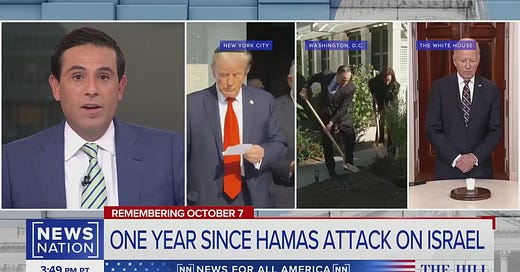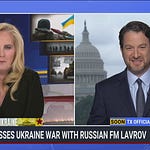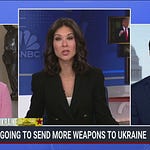This has been a very heavy week already.
Maybe it actually started last week, as the Jewish New Year of Rosh Hashanah ushered in two days of synagogue time, which always tends to be heavy at this time of year anyways. But unlike last year, when the political topic on everyone’s mind at synagogue was the rising tide of Antisemitism here at home (plus sidebar discussions about the judicial reform protests in Israel), this year the air was much thicker. This year, Israel is at war and hate speech against Jews seems to be just about everywhere.
And yet after Rosh Hashanah concluded and the Shofar blew, we all knew there would still be more heaviness to come, as the October 7th anniversary would be up next.
On Monday the 7th, I had two important appointments on my mind. The first was to be a guest on NewsNation’s excellent political show called The Hill (a video clip of the segment where we discussed 10/7 is in this post). The second was more solemn, as I was invited to go to the Israeli embassy to attend a commemoration ceremony of that heinous day. It’s always an honor to be a guest at the Israeli embassy.
As you can imagine, this event was a serious one. The keynote speaker at the event was President Biden’s National Security Adviser Jake Sullivan. I’ve been lucky to have known and seen Jake up close in different venues in DC over the years and he always impresses. He’s kind, well spoken, and above all, sincere in his views. You know that when he speaks, he says it from the heart. And he says it with serious brainpower.
So when Jake spoke at the embassy, in front of an assembled crowd of dignitaries, family members of the victims and hostages, government officials, and Members of Congress, I knew that this would be a poignant speech. Perhaps no one in the U.S. government, outside of the President, Vice President, and Secretary of State, has embodied America’s unflinching support for Israel’s defense like Jake has.
His words landed hard.
There was one passage in particular that made headlines. But it didn’t make waves because it was splashy. It made headlines because it was smart and supportive, as only a true ally can be. And in that room, on that solemn day, it felt like a plea, like tough love, like the words of a dear friend telling you what’s best for you, even if it causes you stress to hear it… because you know deep down it’s true. And so Jake said:
“Backed by the ironclad security partnership of the United States, Israel has demonstrated its remarkable capacity, including through impressive operations that killed terrorists with Israeli and, yes, with American blood on their hands.
The challenge going forward is to turn tactical wins in battle into a strategy that secures Israel's people and its future. That takes real discipline, it takes courage, it takes foresight to match the conduct of war to a clear and sustainable set of objectives and to turn tactical advantage into enduring strategic gains. That is never easy, but it's imperative, and we are here to work with you on that.
Because as I look around this room, I see colleagues that I haven't just gotten to know in the crucible of the past year but in the work that preceded it, a project to make real the vision of broader peace, stability, and economic connectivity across the Middle East and to make real a future where Israelis and Palestinians can live alongside one another in security, dignity, self-determination, and peace.”
This was a speech for the ages with advice borne out of deep, difficult, American military experience in the Middle East. We Americans were at war in the Middle East for two decades. I myself began working on the war in Iraq before there was one, as a State Department civil servant in the Political-Military Affairs Bureau during the first term of President Bush. We’ve learned a lot about war in the Middle East since then.
Back then, we thought we had the wind at our back. Shock and awe and all the bravado that came with it created an emotional power that pulsed through all of Washington. The smell of military victory was everywhere. Yet little did we know or even fully appreciate that what we were experiencing was only a tactical win, not a strategic one as we had thought (and hoped).
We Americans learned the hard way, much too slowly, about what Jake said in plain english on Monday at the embassy. A tactical victory must be converted into a strategic win for it to truly be a victory after all. That’s the lesson we learned and the message that Jake, President Biden, Vice President Harris, and the rest of the Biden team are trying to make clear as true friends of Israel.
So as we head towards the Day of Atonement on Yom Kippur, we must remember this lesson and pray that its wisdom is heard. Because just as we Americans learned hard lessons post-9/11, we’re all living together in a post-10/7 world now.
May the lessons we Americans learned be applied wisely by Israel in the daunting days ahead.














Share this post